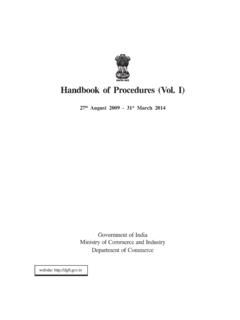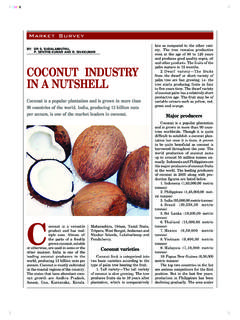Transcription of CONSTITUTIONAL COURT OF SOUTH AFRICA - saflii.org
1 CONSTITUTIONAL COURT OF SOUTH AFRICA . Case CCT 136/17. In the matter between: SIBONGILE ZUNGU Applicant and premier OF THE PROVINCE OF. KWAZULU-NATAL First Respondent MEMBER OF THE EXECUTIVE COUNCIL FOR. THE DEPARTMENT OF HEALTH, KWAZULU-NATAL Second Respondent SIFISO TOKELLO MTSHALI Third Respondent Neutral citation: Sibongile Zungu v premier of the Province of KwaZulu-Natal and Others [2018] ZACC 1. Coram: Mogoeng CJ, Zondo DCJ, Cameron J, Froneman J, Jafta J, Kathree-Setiloane AJ, Kollapen AJ, Madlanga J, Mhlantla J, Theron J and Zondi AJ. Judgments: Mhlantla J. Decided on: 22 January 2018. Summary: Appeal from the Labour Appeal COURT costs rule of practice that costs follow result does not apply in labour matters law and fairness governs the awarding of costs nothing in the present case meriting the award of costs Labour Appeal COURT and Labour COURT did not exercise their discretion judicially.
2 Justice requires that cost orders be set aside and each party pay its own costs appeal on costs upheld and set aside ORDER. On appeal from the Labour Appeal COURT : 1. Leave to appeal on the merits is refused. 2. Leave to appeal against the costs orders of the Labour COURT and Labour Appeal COURT is granted. 3. The appeal on costs is upheld. 4. The costs orders granted by the Labour COURT and the Labour Appeal COURT are set aside. 5. No order as to costs is made in relation to the proceedings in this COURT . JUDGMENT. MHLANTLA J (Mogoeng CJ, Zondo DCJ, Cameron J, Froneman J, Jafta J, Kathree-Setiloane AJ, Kollapen AJ, Madlanga J, Theron J and Zondi AJ concurring): [1] This is an application for leave to appeal against an order of the Labour Appeal COURT in terms of which the applicant's appeal was dismissed with The applicant is Dr Sibongile Zungu.
3 She was employed by the first respondent, the premier of KwaZulu-Natal Province ( premier ) as the Head of Department: Health in KwaZulu-Natal (Head of Department) on a five year contract from 1 December 2009 to 31 July 2014. The second respondent is the Member of the 1. Zungu v premier , Province of KwaZulu-Natal and Another [2017] ZALAC 26. 2. MHLANTLA J. Executive Council for the Department of Health (MEC), and the third respondent is Dr Sifiso Tokello Mtshali, the incumbent Head of Department. The third respondent did not participate in the proceedings. [2] On 26 June 2014, the premier gave notice to the applicant that he had no intention of renewing her contract upon the expiry of her term but would advertise the post. He indicated to the applicant that she could apply if she so wished.
4 Thereafter, the post was advertised and the applicant and other candidates applied. In the interim, short-term extensions were made to the applicant's contract of employment until December 2014. The applicant was one of the candidates interviewed for the position. The selection committee recommended that the applicant be appointed as Head of Department for a further period of five years. [3] In the meantime, certain allegations were levelled against the applicant by the National Education, Health and Allied Workers' Union (NEHAWU). The premier decided to conduct an investigation before making a final decision on the appointment process. This necessitated another extension of the applicant's contract from 1 December 2014 until 31 March 2015. [4] During March 2015, the investigating team submitted a provisional report to the premier and the applicant.
5 It sought more time to conclude the work. There were findings in the report that related to the applicant's managerial shortcomings as an accounting officer. [5] The applicant was concerned that the premier would rely on the provisional report and not appoint her. As a result, on 30 March 2015, a day before her contract was due to come to an end, she launched an urgent application in the Labour COURT . She sought the issuance of a rule nisi calling upon the respondents to show cause why an order in the following terms should not be made: 3. MHLANTLA J. (a) an interdict prohibiting the premier from replacing her with anyone else in the position of Head of Department;. (b) a mandamus (a mandatory direction) that she be appointed as Head of Department in accordance with the recommendation of the selection committee;2 and (c) a declarator that the premier was not entitled to take into account the findings contained in the provisional report.
6 [6] The matter was set down for 31 March 2015. On that day, the hearing was postponed by agreement between the parties to 17 April 2015. The premier undertook not to appoint anyone to the position of Head of Department. After the postponement, the applicant became aware that the premier had appointed Dr Simelane as acting Head of Department with effect from 1 April 2015 until the appointment of a new Head of Department. [7] On 2 April 2015, the applicant received a letter from the premier advising her that her contract had expired and that he had no intention of renewing it. The applicant formed the view that the premier had reneged on the agreement between the parties when he appointed an acting Head of Department. As a result, she launched another urgent application and sought an order declaring that the premier had breached the undertaking not to appoint a Head of Department.
7 In addition, she sought a personal costs order against the premier on an attorney and client scale (de bonis propriis). [8] The premier submitted that, had the position of Head of Department been left vacant, he would have been in breach of the provisions of the Public Finance 2. For ease of reference, the term selection committee will be used throughout this judgment. In their submissions, the parties use selection committee and selection panel interchangeably, however the term selection committee is the term adopted in section of the Public Service Regulations, 2001. GN No. R. 1, 5 January 2001 (Public Service Regulations). 4. MHLANTLA J. Management Act3 (PFMA) which preclude him from leaving the position of an accounting officer [9] The Labour COURT , per Lallie J, held that the agreement by the parties related to the subject matter of the original application.
8 This was the appointment in the Head of Department position for a period of five years. In terms of the agreement, the premier had undertaken not to make that appointment pending the finalisation of the dispute between the parties. That appointment had not been made. The Labour COURT held that the premier had not undermined the agreement because he had placed someone only as an acting Head of Department, not as permanent Head of Department. The Labour COURT further stated that the defence by the premier that he was bound by the PFMA was not challenged by the applicant. It therefore dismissed the urgent application and postponed the remainder of the application to 17 April 2015. in terms of the agreement between the parties. The Labour COURT declined to make a costs order against the [10] On 21 April 2015, the main application was eventually heard by the Labour COURT before Whitcher The Labour COURT dismissed the main application on the grounds that it had no jurisdiction and that, in any event, no case had been made for urgency or for final interdictory relief.
9 With regard to jurisdiction, it held that the nature of the dispute between the applicant and the premier was connected to a dismissal issue, that is, whether there was a legitimate expectation of the contract to be renewed. Therefore, the dispute fell within the exclusive jurisdiction of the Commission for Conciliation, Mediation and Arbitration (CCMA) or the relevant 3. 1 of 1999. 4. Section 36(1) of the PFMA states that [e]very department and every CONSTITUTIONAL institution must have an accounting officer . Section 37 provides that . [w]hen an accounting officer is absent or otherwise unable to perform the functions of accounting officer, or during a vacancy, the functions of the accounting officer must be performed by the official acting in the place of that accounting officer.
10 5. Zungu v premier of the Province of KwaZulu-Natal and Another [2015] ZALCJHB 122. 6. Zungu v premier of the Province of KwaZulu-Natal and Another, unreported judgment of the Labour COURT , KwaZulu-Natal, Case No. D244/15 (21 April 2015). 5. MHLANTLA J. bargaining council. The Labour COURT thus dismissed the application for an interdict with costs. Labour Appeal COURT [11] Aggrieved by the decision, the applicant appealed to the Labour Appeal COURT . Whilst the appeal was pending, the premier advertised the post and appointed the third respondent as the Head of Department. [12] In the Labour Appeal COURT , the applicant challenged the conclusion of the Labour COURT that it had no jurisdiction because the issue related to a dispute that had to be referred to the CCMA. She contended that her cause of action was that the premier 's decision not to adopt the recommendations of the selection committee was irrational and susceptible to review under the Promotion of Administrative Justice Act7 (PAJA).
















